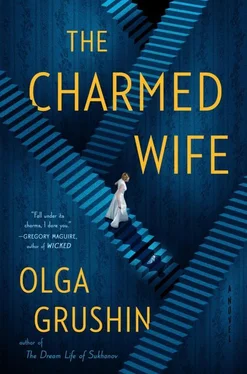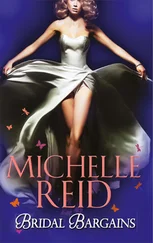The Tuesday princess, by far the richest of them all, is elegant and sleek, slinking about her suburban mansion on feet soft as paws, lying sprawled on sofas in sophisticated silk dresses, grooming herself, her eyes evasive and smooth, stacks of golden bracelets jingling up and down her skinny arms. She takes the longest to speak to me, and even then, she purrs with half-truths and omissions. Still, I learn that in her youth, she was a beautiful white cat, a royal cat, no less, but she fell in love with a broad-shouldered, happy-go-lucky peasant youth entirely indifferent to her charms—he was a dog person—and the less he cared, the harder the thorn of love pinned down her soul. She invited him to live in her palace, gave him fine wines to drink, delicacies to eat, velvets and jewels to wear, and still he preferred his slobbery romps with street mutts to an hour of refinement in her discerning feline presence. At last, in despair, she begged him to cut off her head—and when he did, a lovely woman appeared in place of the cat, so, rendered dumb by the shock, the youth gave in and married her right on the spot. And, fifteen years later, they are married still, but now she often snaps, scratches, and spits at him, for she feels poisoned by the hateful recollection of the ease with which he granted her long-ago wish to behead her—a shrug and “Sure,” carelessly tossed off—and, too, she often catches her ever-gorgeous husband looking at her with amiable speculation, as though wondering what kind of delightful new being might emerge and grace him with her effervescent presence if he cut off the head of his tiresomely nagging, aging wife.
The Wednesday princess, the youngest, married a wolf. He terrorized her neighborhood for many a season, powerful muscles rolling under his shaggy pelt, devouring maidens and, on occasion, their mothers (though not grandmothers, rumors notwithstanding, for their meat was too dry for his liking), when she came dancing across his way one sunny day, a basket of homemade provisions in the crook of her elbow. He treated himself to her roast chicken and her rhubarb pie, thinking to eat her next—and then, somehow, found himself intrigued, for she wore bright colors, sang happy songs, had a mouth the color of burst berries, and was not a whit afraid of him. And so he brought her home instead, and she was ecstatic at first—she knew herself special for taming a savage creature of the dark forest—and she went around his house singing “Tra-la-la!” and cooking delicious suppers. Yet she soon noticed that if she happened to cease her singing for even a minute or burn even one piece of toast, his eyes would narrow and his tongue would take a few saliva-drenched lolls by his great yellow teeth. The more it happened, the more apprehensive she grew, until her apprehension turned to fear. Some months ago, she happened to meet a young hunter, she confided to me shyly. She is now weighing her options.
The Thursday wife was rescued by her prince from the top of a tree in the heart of the forest, where she sat naked and alone, for what reason she herself cannot recall—it seems like a different life. He had not asked whether she wanted to be rescued. Had she been asked, she is not sure what answer she would have given at the time, yet now—now she misses her tree. But it is the Friday princess, the most beautiful of the five, whose story bothers me most. When she first married her husband, he was a beast under a spell, yet she loved the sad, shriveled seed of a soul that she sensed fluttering beneath his fur and fangs. Devotedly, she followed every last bit of advice she mined from fashion magazines—she perfected her housekeeping skills, splurged on his creature comforts, did not complain about her own petty troubles when her beast came home from work, but listened with avid interest as he grouched for hours on end; nor did she ever forget to take a few minutes to refresh herself before his arrival, putting a touch of lipstick on her mouth and a ribbon in her hair. She arranged his pillows, took off his shoes, and treated him as the master of the house long after he had stopped roaring at her—and, in time, her tender ministrations made him soft and gentle in her hands, a new, caring, sensitive man. Now they should be happy together, but she is getting bored—and gradually, she is beginning to understand that what she loved was not the man himself, nor the beast, but her own near-magical power to effect the transformation from the one to the other. She does not tell me that, not in these exact words, but over a glass of sherry, she whispers that she has undercooked his steak on purpose once or twice, has forgotten to sew on an occasional button, has met him, with some regularity, with curlers in her hair—and even though he has appeared patient and understanding so far, she thinks she might have detected a growl in his voice now and then, and it has made a small flame of excitement flare up in her heart grown lardy on tedium. Who knows what he might turn into next, if only she keeps at it, she says, smiling dreamily into her second sherry of the afternoon. After her third glass, she grows giggly and brings over an instructional book she was given by her mother as a wedding present, Married Life and Happiness , penned by a New York physician some three decades ago, and, slurring slightly, recites a paragraph: “Remember that the old idea that a wife is the husband’s chattel to do with as he pleases is going out of fashion. The idea that woman has no soul and should be treated on a par with imbeciles and idiots is also becoming antiquated. Women are really beginning to find out that they are human beings, almost as good as we are”—upon which she dissolves into peals of inebriated laughter, and I hasten to excuse myself under a pretext of another cleaning engagement.
I recount these women’s stories to Dr. Wand at our next session.
“And how do they make you feel?”
“I would have felt hopeless a year ago. Now I just feel impatient. Because they are all more or less the same story, and they all end quite badly. Are there no happy endings for anyone anymore?”
She muses for a moment.
“In Shakespeare’s times, did you know,” she says at last, “any story that ended with marriage was considered a comedy. Doesn’t that strike our modern sensibilities as ironic? I’d say the ending would depend largely on the beginning, and none of these beginnings seems particularly promising to me. You can’t have the right answer to a wrong question, you know. And expectations play a vital part, as well. Are you ready to talk about what happened at the end of your own marriage?”
This question is our weekly rite of passage. I shake my head, so we discuss the approaching meeting with my children instead—now that my court date has been set for the summer, my tough no-nonsense lawyer has arranged for me to see Angie and Ro for an hour every Sunday, under the supervision of Dr. Wand, who, it turns out, is a trusted old friend of my husband’s family and, too, specializes in treating childhood traumas. She cautions me not to be clingy, not to reveal my anxieties, not to badmouth their father, and, however I feel, not to cry. When I see them at last—we meet for a walk in Central Park on a beautiful March evening, mere blocks from their home (I can no longer think of it as mine, if ever I did)—I am overjoyed by the sight, by the smell, by the feel of them, the sheer physicality of their presence, and stricken by how tall they have grown in the months we have spent apart from each other, and devastated by the slight formality with which they greet me, the detached stiffness of their first embrace, the awkwardness with which we struggle to find initial topics of conversation—but only for a few minutes, because Ro is already telling me about a puppy his daddy bought him (But I can’t compete with a puppy, I scream inside, then try to put the smile back on my face and listen to the sounds of my son’s cruel joy), and Angie reveals the gap in her gums where her last baby tooth has fallen out.
Читать дальше












